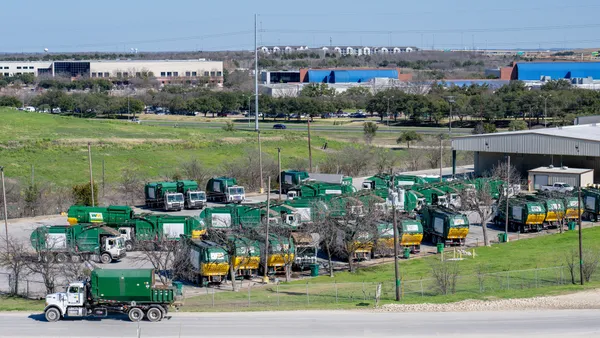Dive Brief:
- Nearly 60% of waste that Portland residents and businesses tossed in 2014 was diverted from landfill to be recycled, composted or converted to energy—10% more than was diverted 10 years ago, which, as in previous years, tops rates around the state. But the numbers represent the region's first decline in nearly a decade, according to Oregon Department of Environmental Quality's (DEQ) annual Material Recovery and Waste Generation Report. A decrease in the recovery of paper, wood, and scrap metal accounts for the decline.
- There was also a 3.36% decrease in waste generated per person, an ongoing trend; figures dropped 5% since 2009, and 23% since 2004.
- The report is a compilation of data generated by garbage haulers and recycling and composting companies. Numbers, based on weight, include Clackamas, Multnomah, and Washington counties.
Dive Insight:
"People here care deeply about conserving our natural resources," said Metro Council president Tom Hughes. "For a lot of folks, recycling has been a part of their daily practice – at home and at work – for 40 years. It's in our DNA."
While recycling is considered quite ritual for Portland's region, it is curious that there are drops in recovery for paper, wood, and scrap metal. According to the Oregon Metro, the drops in paper recovery could be cited to decreases in magazine circulations, newsprint, or distribution of junk mail. Figuring out why metal and wood waste dropped will require more analysis.
"Scrap metal and wood waste are associated primarily with the construction and industrial sectors," said Matt Korot, Metro Resource Conservation and Recovery program manager [industries experiencing a boom.] "We'll be working closely with DEQ to figure out why these rates went down."
Regardless, Oregon legislature’s establishment in 2001 of waste generation goals seems to be working, as among those goals was a reduction of waste generated per person. The goal beginning in 2005 was for there to be no increase and the state is holding steady. And Portland is ahead of the curve, as the national recycling rate is 34%.
Korot says recycling will always be a priority. "But an important focus is also making thoughtful decisions about what we purchase, which may allow us to cut down on what we toss overall, whether it’s paper or food scraps or plastic, and whether it’s at home or at a business," he said.











